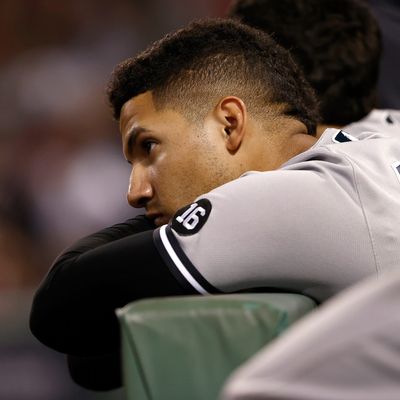
With the Yankees’ 6-2 loss to the Red Sox on Tuesday night in the American League Wild Card game, another letdown of a season is in the books. It’s now been 12 years and counting since the Yankees have won the World Series; the team recently completed their first decade without a Fall Classic appearance in a century, and though they’ve made the playoffs six times since 2015, they’ve won their division just once in nine seasons. For most organizations, a stretch like this isn’t especially troubling, but for the Yankees — a franchise whose entire brand is built on winning titles and carrying on the legacy of Ruth and Gehrig and DiMaggio and Mantle and all the rest — it’s a five-alarm crisis.
There’s no shortage of blame to go around this year: bad hitting, bad baserunning, bad managing, a lucky turtle that clearly wasn’t lucky enough. But there’s a more fundamental flaw in how ownership and general manager Brian Cashman have approached the construction of their roster. For years now, the Yankees have attempted to stay under (or least near) baseball’s competitive balance tax threshold — a dollar amount over which teams are taxed by the league in an effort to discourage rich teams from spending too much on salary. It’s been an ongoing subplot to this season: Can the Yankees maneuver to stay under the threshold? Would they be willing to inch over it at the trade deadline? How much could they save if they don’t cross it?
And so as an off-season of changes begins, this is as good a place as any to start: It’s time for the Yankees to start acting like the richest team in the history of the sport and stop caring, even a little bit, about the luxury tax.
The Yankees’ fixation on finances isn’t a new phenomenon. For years, they’ve treated the threshold like a soft salary cap, and in 2018, they actually did get under it (as it appears they will have this season once the final figures are calculated). Speaking of 2018: Forbes estimated that the Yankees earned $668 million in revenue that year, and that their percentage of revenue spent on payroll was the lowest in Major League Baseball. The team’s estimated value in 2018 was $4 billion. And in the years since, it’s jumped to nearly $5.25 billion, making them the second-most-valuable sports franchise in the world, and by far the most valuable in Major League Baseball.
In an era of statistical savvy, it’s harder than ever to capitalize on the types of market inefficiencies laid out almost 20 years ago in Moneyball. But the Yankees still have one massive advantage over everyone else: They are the Yankees. It’s not like they’ve entirely avoided big contracts in recent years — Gerrit Cole and Giancarlo Stanton are among the highest-paid players in the league — but with no salary cap to contain them, those contracts shouldn’t prevent them from spending to fill other needs, too. The Yankees’ payroll was second-highest in baseball this year, roughly the same as the Astros, Padres, and Red Sox, but well behind the Dodgers. Indeed, in many ways, the Dodgers, who make big, expensive bets to supplement their homegrown players (even if it blows them past the threshold), have become a more successful version of what the Yankees aspire to be.
This isn’t to say that the Yankees should depend entirely on the free-agent market to build their roster. Any good team needs to develop players — and, critically, properly evaluate the homegrown players that come up through their system. It’s also not to say that the Yankees should expect a quick fix. They look less and less each year like a team that’s just a player or two away, and they don’t have many free agents coming off the roster this season. (The free-agent and trade markets won’t always align with a team’s precise needs, either.) This winter, they could be looking for a new first-baseman, and could also move on from Gary Sanchez at catcher. They’re perpetually looking for starting pitching, and also need to figure out a long-term plan at shortstop, where 20-year-old Anthony Volpe is turning heads in the minors, but where a loaded free-agent class beckons as well. (Also on their radar: a potential huge payday for Aaron Judge, who’s a year away from free agency.) But as the Yankees turn over their roster, however slowly they have to do it, payroll constraints shouldn’t hold them back.
Major League Baseball’s labor war with the MLBPA is looming, and it’s possible the luxury tax will look very different next year. The league’s first proposal for a new collective bargaining agreement included a dramatically lower threshold — one the players union will surely fight. But anything short of a hard salary cap should free the Yankees to use the unparalleled resources they have, and do what they’ll forever be accused of attempting to do anyway: buy a damn World Series trophy.





























